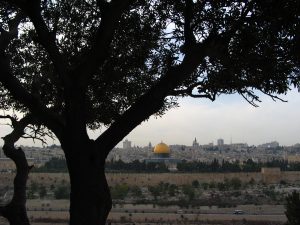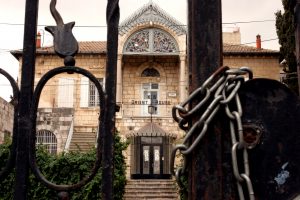One day during August 2001, Ariel Sharon decided to close the Orient House in an attempt to end any PLO-related activity in Al-Quds (Jerusalem). Along with this decision, a number of other representative organizations were also closed based on the pretext that they were funded by the Palestinian Authority, hence, according to the Israeli government, in violation of the agreements of the Oslo Accords. This included the Arab Chamber of Commerce and Industry, which was established in 1936, many years before the creation of the State of Israel, as well as the Higher Council for the Palestinian Tourism Industry.
Needless to say, neither organization was supported by the Palestinian Authority beyond the natural, historic relations that link family members together. The Higher Council for the Palestinian Tourism Industry office in Al-Quds was raided and closed down, preventing any access to its files, promotional materials, furniture, computers, or tools.
The higher council was one of the very first efforts to create an umbrella platform to represent the interest of tourism development in Palestine. It operated as a professional representative committee and had a director and other staff who served its strategy and coordinated the undertakings of its seven active and legally registered member organizations at the time. These were the Arab Hotel Association, the Tour Operators’ Association, the Arab Tourist Guide’s Union, and the representatives of the tourism transport companies, the souvenir shops, the airlines, and the tourism restaurants. Indeed, some of these organizations were stronger and much more active than others, but the general spirit at the time was to move forward as needed in providing the technical assistance for the individual organizations. This initiative was mainly supported by the GIZ, German Cooperation, called GTZ at the time. One of the main investments of this endeavor was to create the joint council of the tourism industry, essentially advocating for a public-private partnership (PPP) between the tourism industry associations and the newly formed Palestinian Ministry of Tourism and Antiquities in order to enhance and consolidate all the administrative, organizational, promotional, and professional efforts invested in enhancing Palestinian tourism.

But in fact, the Israeli decision to close the higher council only contributed to a reevaluation and a shake-off of the weaknesses inherited in the initial process. In its first round, the joint council had reached a deadlock for a variety of reasons. The invested efforts, however, led to a more mature and more involved second phase. The lack of support for the next steps took its toll on the weaker tourism organizations. Essentially, only three of them emerged as the future leaders of the Palestinian tourism industry, namely, the associations or unions that represent the hotels, the tour operators, and the tour guides. At one point during this transformation, the tour operators’ association split into two specialized organizations. The Palestinian Society of Tourist and Travel Agents (PSTTA), which represented most of the outgoing and ticket-sales business, and the Holy Land Incoming Tour Operators Association (HLITOA) emerged. The latter joined the hotels and the guides associations in creating the Higher Council for the Palestinian Tourism Industry, which basically included the three main representatives of the industry. The tourism restaurants failed to establish a body to represent them; the airline companies pulled most of their representations on the Palestinian side; most of the tourism transport activists grew to become incoming tour operators in their own right and hence joined the HLITOA; and the souvenir shops kept mostly to themselves.
One of the most evident achievements of the tourism organizations council was its ability to keep close ties und unite efforts with the Palestinian Ministry of Tourism and Antiquities, specifically with the then deputy minister and later minister of tourism and antiquities, Dr. Khouloud Daibes. Together they formulated the draft bylaws of the Palestinian tourism board and the basis for the tourism law update. After many months of deliberations and preparations, when the bylaws of the tourism board were ready, the Palestinian government and the prime minister’s office turned down the request to establish the tourism board PPP platform and only authorized the establishment of an advisory board for the minister. This advisory committee had no authority and no legal or professional structure. It merely brought insight and support to the minister and enhanced ad-hoc coordination between the public and private sectors.

Nevertheless, this phase produced an interesting by-product. The tourism bylaws allowed for the inclusion of any tourism sector that could properly represent a certain specific specialization related to tourism. This essentially opened the doors for the creation of the Network of Experiential Palestinian Tourism Organizations (NEPTO), which represented the interest of community-based development in Palestine. NEPTO advocated for a new partnership model that called for a stronger presence and representation of the civil society organizations in tourism and cultural heritage preservation. The PPCP model (public-private civil society partnership) enhanced community-based tourism as a vital tourism sector and encouraged related organizations to seek NEPTO’s membership. NEPTO joined the advisory council of the minister of tourism and later implemented a number of interventions that forged the shape of the current dynamics of the tourism sector. It brought under its umbrella a number of community-related tourism initiatives, alternative tourism groups, rural and cultural heritage festivals, fair trade and local-products organizations, wildlife and environmental associations, and architectural heritage centers. All of NEPTO’s twenty organizations shared the passion to work with Palestinian communities across Palestine, hence shedding light on a great deal of forgotten richness and micro Palestinian identities in infamous as well as in lesser-known destinations that had the potential to strongly differentiate the national tourism offer. NEPTO became the leading umbrella to add value to and advocate change in Palestinian tourism through its research and innovation-based strategies.
Over the past twenty years, Palestinian tourism has strived – amidst numerous obstacles – to allow visitors to enjoy comprehensive and profound experiences. Palestinian innovation and creativity have contributed to laying the foundations for competitiveness, effective management, and internationalism.
Meanwhile − and especially following Sharon’s visit to Al-Aqsa and from the consequent outbreak of the second Intifada until 2010, the year when the Oslo process seemed to have ended in the minds of many people and organizations − major changes took place that affected the shape and dynamics of tourism. The Israeli wall around the city of Al-Quds suffocated its lifeline and fragmented its economy and its social structure and changed its compass and aspirations. The subsequent wars on Gaza, particularly the war in 2014, had a detrimental effect on tourism in general and on Al-Quds in particular. The overall result of this transformation was the loss of half the Palestinian hotels in Al-Quds which, unable to withstand the high expenses while running on tourism fumes, had to close down, most of them never to reopen again. Thirty percent of Al-Quds Old City shops also closed their doors. The cultural scene diminished, and the number of cultural events declined considerably. In the meantime, Bethlehem and Ramallah, specifically, grabbed the glamour that Al-Quds had enjoyed before all the divisions and fragmentations that Israel and the current political situation imposed on the city. This led to the formation of a number of Al-Quds-based tourism initiatives, such as the Jerusalem Tourism Cluster, which is leading a strategy to reclaim the central value of tourism and culture in the city and to enhance its indigenous cultural heritage identity and potential. Al-Quds possesses many resources and capacities that are not utilized in its tourism portfolio in particular or in Palestine in general.
Al-Quds (Jerusalem) is a unique destination, present in the hearts and minds of most visitors long before they make their first trip to the city. The Palestinian tourism industry is engaged with creativity and perseverance in expanding its organizational capacities and transforming its tourism-management strategies in Al-Quds and elsewhere to move Palestine towards a brighter future.
This bottom-up approach, which crystalized in the creation of a number of cultural-heritage and tourism initiatives, has realized worthwhile successes in other parts of Palestine as well. Bethlehem has an active consortium to enhance the positioning of the city. Masar Ibrahim has created an internationally renowned path that connects Palestinian communities along a 33- kilometer trail. Among others are the Sufi Trails and the centers of local culture of the Rozana Association, shedding light on many of the lesser-known potential destinations in Palestine. Other ideas and investments ensued, such as the interpretation and narrative centers in the projected micro destinations as well as specializations, clustering, local production, environmental protection, and local leadership and governance structures to foster the management of local resources and capacities. This has brought many lesser-known destinations to light, such as Arraba, Sebastiya, Deir Istiya, Bani Na’im, Battir, Rashaydeh, and others. It has also attracted discerning interest in the other Palestinian cities such as Al-Khalil (Hebron), Nablus, and Jenin.
The profile of tourists visiting Al-Quds has also changed in the past years due in part to easier access to visas and entry permissions. In the past ten years, a growing number of Russians and other Eastern Europeans have been visiting the city. There are also rising numbers of Chinese, more Australians, and generally fewer Americans. What is interesting is the growth of the Islamic market particularly in Al-Quds as it is their primary destination. Actually, Islamic tourism has contributed significantly to the protection of many hotel establishments as well as other services in and around the Old City, saving them from having to close their doors permanently. This is a vital notion to understand, and we must investigate the potentials and limitations particularly as a great deal of Christian pilgrimage has been absorbed by Bethlehem. Yet Islamic tourism is still considerably new and fragile; it has its own challenges and needs to be carefully managed by the Palestinian tourism industry.
The bottom-up approach and the trend to build local destinations are what will define the emerging character of tourism development in the near future. Ms. Rula Maayah, the current minister of tourism and antiquities has been supportive of the various community-based tourism and cultural-heritage initiatives and has welcomed the growing number of new destinations, the diversity, the richness, and the transformation of the national tourism offer. Al-Quds is undergoing a destination revamping and will probably lead a new approach to tourism management. The Al-Quds Tourism and Heritage Council, which includes under its umbrella all the tourism organizations that work in the city as well as representation from the cultural, educational, and CBO sectors, will be leading this effort, a strategy that remains pending evaluation and review.


